
Agriculture
February 6, 2024
UC Berkeley CellScope
Read SolutionImplemented by
Center for Information Technology Research in the Interest of Society and the Banatao Institute
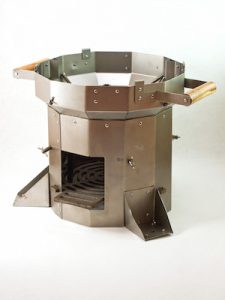
Updated on December 31, 2023
·Created on June 28, 2014
The Darfur Stove is an efficient and improved stove desgined as a result of community involvement in Darfur, Sudan.
Designed by engineers at Lawrence Berkeley National Lab using the knowledge and input of local Darfuri women, the Berkeley-Darfur stove is a highly efficient wood-burning cookstove adapted to local pots, customs, and cooking practices. It has a stainless-steel body and a maximum pot capacity of 15 litres.
Introduction video to the Darfur Stove Project. Potential Energy’s headquarter is located in Kampala, Uganda.
Target SDGs
SDG 7: Affordable and Clean Energy
SDG 3: Good Health and Well-Being
Market Suggested Retail Price
$20.00
Target Users (Target Impact Group)
Household
Distributors / Implementing Organizations
Potential Energy works in collaboration with over 20 local women's organizations in Darfur for the distribution of the stoves. Potential Energy employs both humanitarian and market-based approaches within flexible installment plans, and by donations to vulnerable populations without a regular form of income. Further organizations, such as Impact Carbon, Oxfam America, Plan Canada/Plan International, Sustainable Action Group, USAID have taken part.
Competitive Landscape
Direct competitors include Mimi Moto and SeaChar Deluxe Estufa Finca Farm Stove.
Countries
Congo (Kinshasa), Ethiopia, India, Kenya, Nepal, Sudan, Uganda
Manufacturing/Building Method
A hybrid approach that combines both mass manufacturing and local production is used. The stoves are manufactured as flat-kits in India and then shipped to Sudan where they are assembled in local workshops. Over 35 people play a role in assembling, selling, and distributing the stoves within a production process that includes high-quality control procedures throughout.
Intellectural Property Type
Trade Secret
User Provision Model
Directly from the manufacturer, Potential Energy by contacting them.
Distributions to Date Status
From 2009 to 2015, over 40,000 stoves were distributed. For 2018 and according to Potential Energy, up to 270,000 people have been benefitted from this stove by reducing exposure to toxic smoke and requiring half the firewood of an open fire.
Fuel type
Biomass, wood
Chimney (yes/no)
No
Forced or passive
Passive
Pot type
Flat or round bottom
Pot capacity (L)
Unknown
Thermal efficiency (%)
14.0% – 39.2%
PM emissions (g/MJ delivered to pot)
0.27 – 0.61 g/MJ
CO emissions (g/MJ delivered to pot)
5.17 – 8.21 g/MJ
Time to boil (min/L)
Unknown
Design Specifications
Design specifications include a Rocket-type stain steel-body with a combustion chamber at the bottom. It weighs 5.5 kgs and its dimensions (LxWxH) are 37 x 17 x 30 cm.
Materials for local assembly: rivet guns pliers bending tools.
Technical Support
Potential Energy trains local workers to assemble the stoves at a 'rate of 100 each day' in the Berkeley-Darfur Stove assembly shop. Assembly manual available in English and with photos of the processes is given to partners doing the assembly. Additionally, Potential Energy gives live training and 24-hour support to partners worldwide. The stove comes with a user guide and with photos of the process of lighting, cooking and cleaning, safety recommendations and terms of the guarantee.
Replacement Components
Yes. Technical items such as rivets, pliers, and bending tools can be used to fix/replace some parts.
Lifecycle
The product has a 1-year warranty and an expected lifespan of 5 year. The stove will be replaced in case of manufacturing fault within the first year of use. Stoves damaged by poor handling and use cannot be repaired or replaced by this warranty. After 1 year, stoves may still be repaired for a fee.
Manufacturer Specified Performance Parameters
Darfur Stove reduces fuel consumption from 33% to 17% which results in a money saving of 0.97 USD/day in firewood costs. Over the lifecycle of the stove (5 years), the saving rises to 1,770 USD per household. Within the number of stoves distributed, collective firewood savings are estimated to have created more than 79 USD million in savings.
Vetted Performance Status
In 2013, Potential Energy partnered with UC Berkeley’s Center for Effective Global Action to conduct a rigorous evaluation of stove use by installing heat sensors on 180 stoves and continuously monitored use for several months. For 2018, a total of 8 test have been conducted by a variety of independent labs. Data is available for download via the Clean Cooking Catalog.
Safety
Safety is unrated in the Clean Cookstove Catalog. Guidelines provided by Potential Energy should be followed to avoid burns and spill-overs when manipulating the stove.
Complementary Technical Systems
None.
Academic Research and References
Amrose, S., Kisch, G. T., Kirubi, C., Woo, J., & Gadgil, A. (2008). Development and Testing of the Berkeley Darfur Stove. Report Number: LBNL-116E.
Gadgil, A. et al (2013). Stove Solutions: Improving Health, Safety, and the Environment in Darfur with Fuel-Efficient Cookstoves. Solutions for a sustainable and desirable future. Volume 4. Issue 1.
Preble, C., et al (2014). Emissions and Climate-Relevant Optical Properties of Pollutants Emitted from a Three-Stone Fire and the Berkeley-Darfur Stove Tested under Laboratory Conditions. Environ. Sci. Technol., 2014, 48 (11), pp 6484–6491. DOI: 10.1021/es5002715.
Global Alliance for Clean Cookstoves. 2013. Interim Reporting Requirements for IWA Tiers of Performance. cleancooking.org. Global Alliance for Clean Cookstoves.
International Standards Organization (ISO). n.d. Home. iso.org. ISO.
Clean Cooking Alliance – Clean Cooking Catalog: Results Report – Berkeley-Darfur Stove V.14. n.d. www.catalag.cleancookstoves.org. Global Alliance for Clean Cookstoves.
Get in Touch. n.d. Potential Energy.
Berkeley-Darfur Stove. n.d. Stoves – Lawrence Berkeley National Laboratory.
Curry, Arwen. 2014. Darfur Stoves Project. KQED, November 20, 2014.
The Darfur Stoves Project. 2014. www.youtube.com.
Compliance with regulations
Test performance tier rankings using guidelines and standards established by the International Organization for Standardization (ISO)’s International Workshop Agreement (IWA).
The Berkeley-Darfur Stove V.14 cookstove meets the following Global Alliance Tiers:
• Emissions - Tier 1
• Efficiency - Tier 2
• Indoor Emissions - Tier 1
Evaluation methods
IWA 11:2012 enables stove testers to use laboratory protocols most appropriate for the stove and performance indicator being tested. Testing protocols followed for the Berkley Darfur stove, according to Clean Cooking Catalog include:
• The Water Boiling Test (WBT): a laboratory-based test that can be used to measure how efficiently a stove uses fuel to heat water in a cooking pot and the quantity of emissions produced while cooking. This test can be used to evaluate stove changes during development, compare the effectiveness of different designs, select the most promising products for field trials, and ensure that manufactured stoves meet the intended performance.
• The Controlled Cooking Test (CCT): a field test that measures stove performance in comparison to traditional cooking methods when a cook prepares a pre-determined local meal. The CCT is designed to assess stove performance in a controlled setting using local fuels, pots, and practice. It reveals what is possible in households under controlled conditions but not necessarily what is actually achieved by households during daily use.
Other Information
Potential Energy is also conducting clean cookstove dissemination in Uganda.

Agriculture
February 6, 2024
Implemented by
Center for Information Technology Research in the Interest of Society and the Banatao Institute
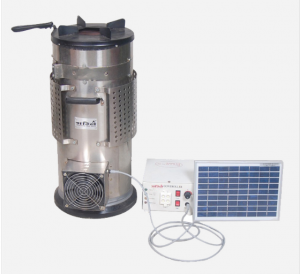
Agriculture
November 30, 2024
Implemented by
NDMI Renewable Energy Private Limited
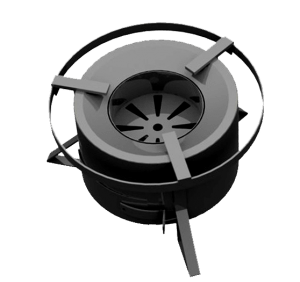
Agriculture
November 19, 2024
Implemented by
Kenya Stove Works Ltd.
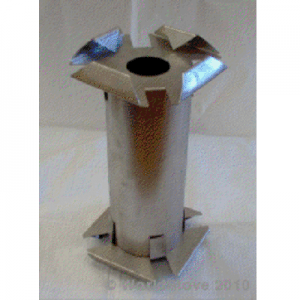
Agriculture
November 30, 2024
Implemented by
WorldStove
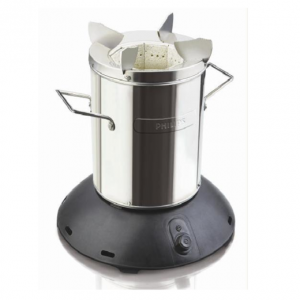
Agriculture
November 30, 2024
Implemented by
Philips
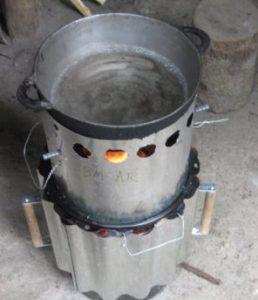
Agriculture
December 29, 2023
Implemented by
SeaChar
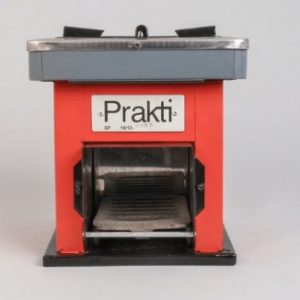
Agriculture
November 19, 2024
Implemented by
Prakti Design
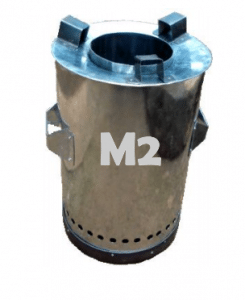
Agriculture
December 28, 2023
Implemented by
Wisdom Stoves
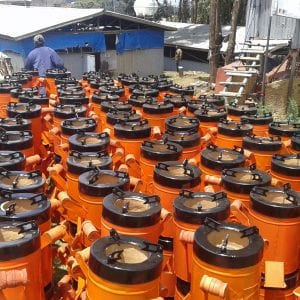
Agriculture
December 3, 2024
Implemented by
Gogle
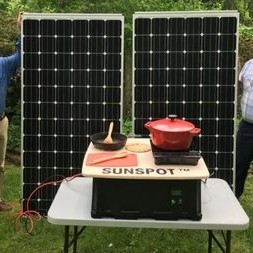
Agriculture
January 27, 2024
Implemented by
Sunspot PV LLC
Have thoughts on how we can improve?
Give Us Feedback